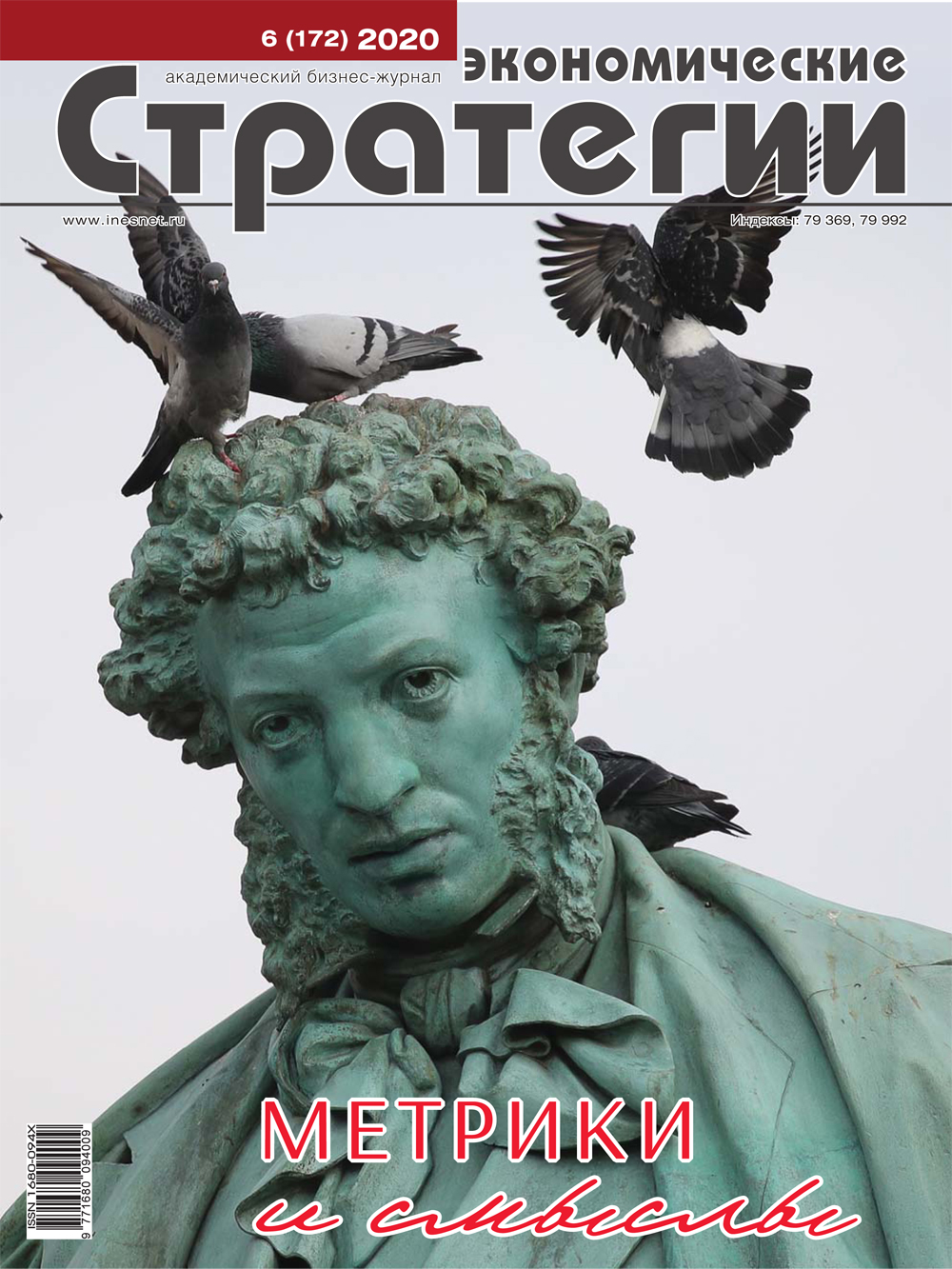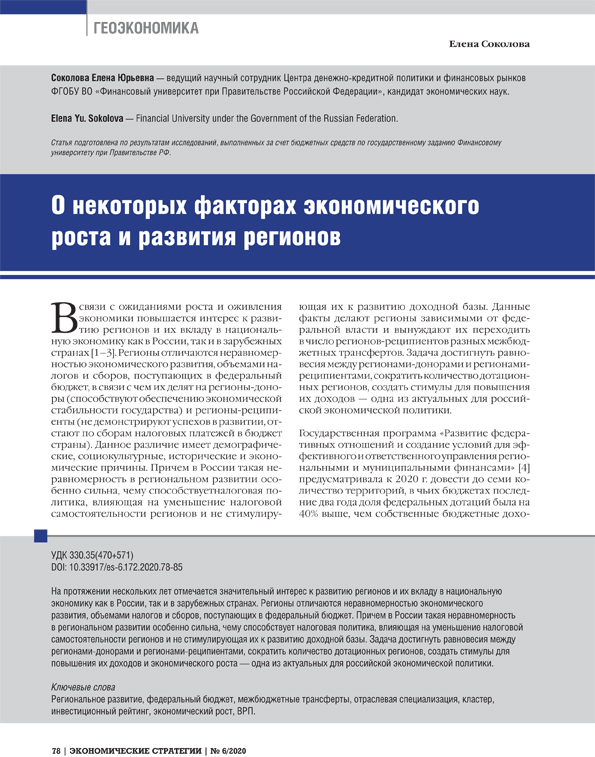On Some Factors of Economic Growth and Regional Development
DOI: 10.33917/es-6.172.2020.78-85
For several years, there has been a considerable interest in the development of regions and their contribution to the national economy, both in Russia and in foreign countries. The regions are characterized by uneven economic development and the amount of taxes and fees going to the Federal budget. Moreover, in Russia, this unevenness in regional development is particularly strong, which is facilitated by tax policy that affects the reduction of regional tax independence and does not encourage the regions to develop their income base. The task of achieving a balance between donor and recipient regions, reducing the number of subsidized regions, and creating incentives to increase their incomes and economic growth is one of the most actual problems of Russian economic policy.
References:
1. Ohmae K. New model China. Project Syndicate, 2002, July 31, available at: https://www.projectsyndicate.org/commentary/new-model-china?barrier=accessreg.
2. Toffler E., Toffler Kh. Revolyutsionnoe bogatstvo [Revolutionary Wealth]. Moscow, AST, 2008.
3. Kutsenko E.S., Abashkin V.L., Islankina E.A. Fokusirovka regional’noi promyshlennoi politiki cherez otraslevuyu spetsializatsiyu [Focusing Regional Industrial Policy Through Industry Specialization]. Voprosy ekonomiki, 2019, no 5, pp. 65–89.
4. Postanovlenie Pravitel’stva RF ot 18 maya 2016 g. N 445 (red. ot 26 dekabrya 2019 g.) “Ob utverzhdenii gosudarstvennoi programmy Rossiiskoi Federatsii ‘Razvitie federativnykh otnoshenii i sozdanie uslovii dlya effektivnogo i otvetstvennogo upravleniya regional’nymi i munitsipal’nymi finansami” [Resolution of the RF Government No. 445 Dated May 18, 2016 (as Amended on December 26, 2019) “On Approval of the State Program of the Russian Federation “Developing Federal Relations and Creating Conditions for Effective and Responsible Management of Regional and Municipal Finances”]. Ofitsial’nyi sait Minfina Rossii, available at: https://www.minfin.ru/ru/perfomance/budget/govprog/regfin/
5. Klimanov V.V., Lavrov A.M. Mezhbyudzhetnye otnosheniya v Rossii na sovremennom etape [Interbudgetary Relations in Russia at the Present Stage]. Voprosy ekonomiki, 2004, no 11, pp. 111–125.
6. Zhuravskaya E. Federalism in Russia. Russia after the global economic crisis. Washington, D.C.: Peterson Institute for International Economics, 2010, pp. 59–77.
7. Barakhovskii A.C., Busarova A.B., Vaksova E.E., Efimov I.L. Monitoring kachestva upravleniya subnatsional’nymi obshchestvennymi finansami [Monitoring the Quality of Subnational Public Finance Management]. Moscow, Lenand, 2005.
8. Zubarevich N.V. Regional’naya proektsiya novogo rossiiskogo krizisa [Regional Projection of the New Russian Crisis]. Voprosy ekonomiki, 2015, no 4, pp. 37–52.
9. Yushkov A., Oding N., Savul’kin L. Sud’by rossiiskikh regionov-donorov [Destiny of Russian Donor Regions]. Voprosy ekonomiki, 2017, no 9, pp. 83–97.
10. Mikhailova A.A., Klimanov V.V., Safina A.I. Vliyanie mezhbyudzhetnykh transfertov na ekonomicheskii rost i strukturu regional’noi ekonomiki [Impact of Intergovernmental Transfers on Economic Growth and Structure of the Regional Economy]. Voprosy ekonomiki, 2018, no 1, pp. 91–103.
11. OECD. Regional benchmarking in the smart specialization process: identification of reference regions based on structural similarity. S3 Working Paper Series. 2012.
12. Rodrik D. New model China. Project Syndicate, available at: https://www.projectsyndicate.org/commentary/new-model-china?barrier=accessreg.
13. Agenda for a reformed cohesion policy. Independent Report, available at: http:// www.europarl.europa.eu/meetdocs/2009_2014/documents/regi/dv/barca_report_/barca_report_en.pdf Bianchi P.
14. OECD. Promoting growth in all regions. Paris: OECD Publishing. OECD, available at: https://www.oecd.org/publications/promoting-growth-in-all-regions-9789264174634-en.htm .
15. Edmondson G., McCollam S., Kelly E. 5 steps to smarter specialization. Science. Business Publishing. 2014.
16. Zubarevich N.V. Regiony Rossii: itogi 2016 g. Rossiya 2017. Ezhegodnyi doklad Franko-rossiiskogo analiticheskogo tsentra Observo [Regions of Russia: Results of 2016: Russia 2017. Annual Report of Observo, French-Russian Analytical Center]. Moscow, Observo; Novyi vek media, 2017.
17. Kutsenko E.S., Islankina E.A., Kindras’ A. Mozhnoli byt’ umnym v odinochestve? Issledovanie innovatsionnykh strategiirossiiskikh regionov v kontekste umnoi spetsializatsii [Can One Be Smart in Solitude? Research of the Russian Regions’s Innovative Strategies in the Context of Smart Specialization]. Forsait, 2018, no 1, pp. 25–45.
18. Hausmann R., Hidalgo C.A., Bustos S., et al. The atlas of economic complexity: Mapping paths to prosperity. Cambridge, MA: MIT Press, 2011.
19. Tacchella A., Cristelli M., Caldarelli G., et al. A New Metrics for Countries’ Fitness and Products’ Complexity. Scientific Reports, 2012, Vol. 2, Article number 723, available at: https://doi.org/10.1038/srep00723.
20. Kutsenko E.S., Abashkin V.L., Islankina E.A. Fokusirovka regional’noi promyshlennoi politiki cherez otraslevuyu spetsializatsiyu [Focusing Regional Industrial Policy Through Industry Specialization]. Voprosy ekonomiki, 2019, no 5, pp. 65–89.
21. GISIP, available at: https://www.gisip.ru/
22. S lvell ., Lindqvist G., Ketels C. The cluster initiative greenbook. Stockholm: Bromma Tryck AB, 2003.
23. Innovatsionnye klastery — lidery investitsionnoi privlekatel’nosti mirovogo urovnya: Doklad VShE [Innovation Clusters — Leaders of the World-class Investment Attractiveness: the HSE Report]. Moscow, NIU VShE, 2017.
24. Kutsenko E., Abashkin V., Fiyaksel’ E., Islankina E. Desyat’ let klasternoi politiki v Rossii: logika vedomstvennykh podkhodov [Ten Years of Cluster Policy in Russia: the Logic of Departmental Approaches]. Innovatsii, 2017, no 12, pp. 20–32.
25. Rasporyazhenie Pravitel’stva RF ot 13 fevralya 2019 g. N 207-r “Ob utverzhdenii Strategii prostranstvennogo razvitiya Rossiiskoi Federatsii na period do 2025 goda” [Order of the Government of the Russian Federation of February 13, 2019 No. 207-r “On Approval of the Spatial Development Strategy of the Russian Federation for the Period up to 2025”]. Kodeks, available at: http://docs.cntd.ru/document/552378463.
26. Barinova V.A., Zemtsov S.P., Tsareva Yu.V. Predprinimatel’stvo i instituty: est’ li svyaz’ na regional’nom urovne v Rossii? [Entrepreneurship and Institutions: are There Any Relationships at the Regional Level in Russia?]. Voprosy ekonomiki, 2018, no 6, pp. 92–116.
27. Djankov S., McLiesh C., Ramalho R. Regulation and growth. Economics Letters, Vol. 92, 2006, N 3, pp. 395–401.
28. Eifert B. Do regulatory reforms stimulate investment and growth? Evidence from the doing business data 2003–07. Working Paper, N 159, 2009, Washington, DC: Center for Global Development.
29. Nikitin A. Investitsionnyi reiting kak instrument stimulirovaniya effektivnosti upravleniya razvitiem regionov Rossii [Investment Rating as a Tool to Stimulate the Efficiency of Managing the Russian Regions Development]. Ekonomicheskaya politika, 2016, no 6, pp. 192–221.
30. Kartaev F.S., Polunin K.E. Vliyaet li reiting investitsionnogo klimata na ekonomicheskoe razvitie regiona? [Does the Investment Climate Rating Affect the Region’s Economic Development?]. Voprosy ekonomiki, 2019, no 5, pp. 90–102.



